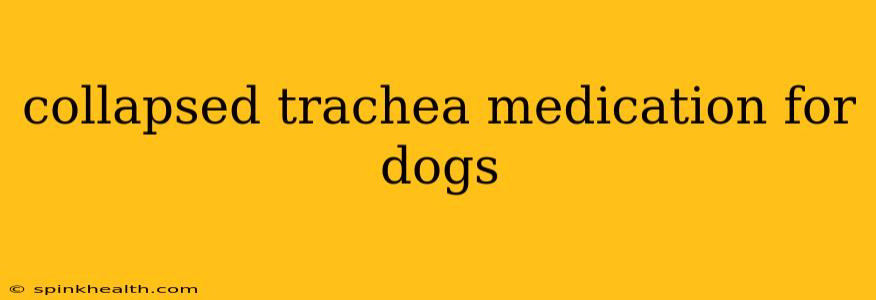Collapsed Trachea Medication for Dogs: A Pet Owner's Guide
The frantic wheeze, the honking cough – these are sounds no dog owner wants to hear. They often signal a collapsed trachea, a distressing condition affecting many canine companions, particularly smaller breeds. While there's no magic cure, understanding the available medications and management strategies can significantly improve your dog's quality of life. This isn't just about treating the symptoms; it's about giving your furry friend the best chance at a comfortable life.
My own experience with this started a few years ago. My miniature dachshund, Pip, started making these strange noises. At first, I dismissed it, thinking it was just a bit of a cough. But it persisted, worsening with exertion, and that's when the panic set in. The vet's diagnosis: collapsed trachea. The journey that followed taught me a lot about managing this condition, and I hope this guide can help you navigate it too.
What is a Collapsed Trachea in Dogs?
Before we delve into medication, let's understand the condition. A collapsed trachea occurs when the rings of cartilage supporting the trachea (windpipe) weaken and flatten, partially obstructing airflow. This leads to the characteristic honking cough and wheezing. Several factors can contribute, including genetics (small breeds are predisposed), obesity, chronic coughing, and even pulling on a collar.
What Medications are Used to Treat a Collapsed Trachea in Dogs?
There isn't a medication that "fixes" a collapsed trachea, but several can manage the symptoms and improve your dog's breathing. The specific medication will depend on the severity of the collapse and any underlying conditions.
Bronchodilators: These medications help relax the airway muscles, widening the trachea and improving airflow. They often come in inhaler form (like human asthma inhalers, but specially formulated for dogs) or as oral medications. Common examples include terbutaline and albuterol. My vet prescribed Pip terbutaline, and it helped significantly with his coughing fits.
Cough Suppressants: While it might seem counterintuitive to suppress a cough, in some cases, it can be helpful to reduce irritation and discomfort. These medications can provide temporary relief but shouldn't mask underlying problems.
Corticosteroids: These are anti-inflammatory drugs that can reduce swelling in the airways. They are usually used in cases of severe inflammation or if there's an underlying allergic component. Prednisone is a commonly prescribed corticosteroid. However, long-term use can have side effects, so they are usually used short-term or in specific situations.
What are the side effects of medication for a collapsed trachea in dogs?
As with any medication, there's a possibility of side effects. These vary depending on the drug and your dog's individual sensitivity. Some common side effects include:
- Increased thirst and urination (polydipsia/polyuria): This is particularly common with corticosteroids.
- Increased appetite: Again, often seen with corticosteroids.
- Gastrointestinal upset (vomiting, diarrhea): This can occur with various medications.
- Restlessness or anxiety: This can be a side effect of some bronchodilators.
It's crucial to discuss potential side effects with your veterinarian and monitor your dog closely for any unusual changes in behavior or health.
What other treatments are available for a collapsed trachea in dogs?
Medication is often part of a broader management plan. Other important strategies include:
- Weight Management: Maintaining a healthy weight reduces strain on the trachea.
- Harness Instead of Collar: Pulling on a collar can exacerbate the condition; a harness distributes pressure more evenly.
- Environmental Modifications: Reducing exposure to irritants like dust and smoke can help.
- Surgery: In severe cases, surgery may be an option to place a stent in the trachea or perform a surgical repair. This is a last resort decision made in consultation with your vet.
Is there a cure for a collapsed trachea in dogs?
Unfortunately, there is no cure for a collapsed trachea. However, with proper management—including medication, lifestyle adjustments, and regular veterinary checkups—you can help your dog live a long and comfortable life despite this condition. The goal isn't to "fix" the trachea but to manage the symptoms and prevent further deterioration.
Remember, every dog is different, and treatment plans are tailored to individual needs. Always work closely with your veterinarian to develop a comprehensive management strategy for your dog's collapsed trachea. Early diagnosis and proactive management are key to ensuring your furry friend's comfort and well-being. My experience with Pip taught me the importance of this holistic approach. He's still with me, thriving, thanks to a good veterinary partnership and careful attention to his needs.

